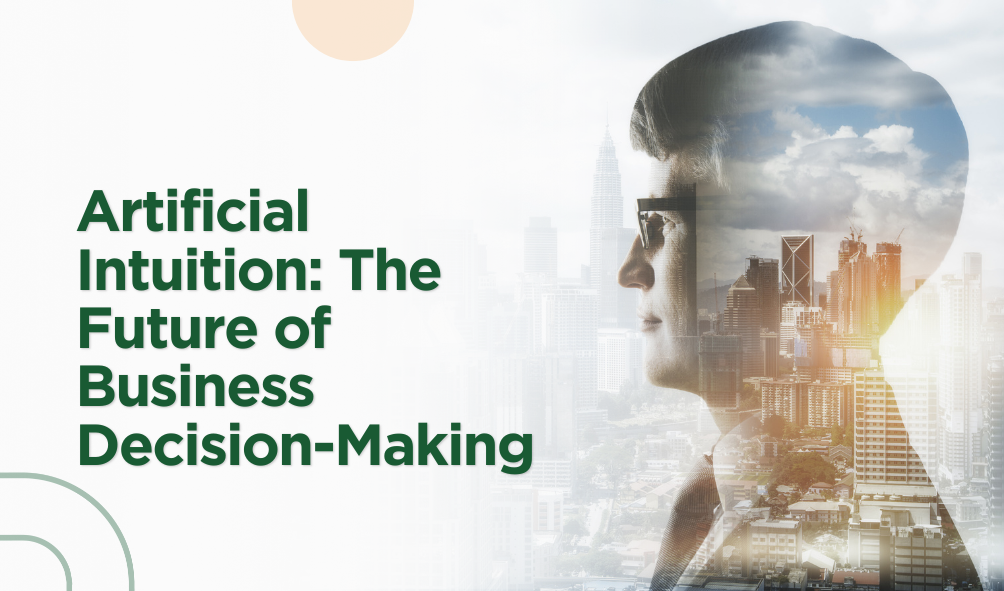Artificial Intuition: The Future of Business Decision-Making
In the rapidly evolving digital landscape, businesses are constantly seeking innovative tools and approaches to stay competitive. While Artificial Intelligence (AI) has been a dominant force, a new concept is gaining traction: Artificial Intuition (AIu). Artificial intuition is distinct from traditional AI as it mimics human intuition, making fast decisions based on patterns and experiences without relying on complex logic or predefined rules. As businesses navigate increasing complexities, artificial intuition holds immense potential to transform decision-making processes and drive innovation. This article explores how artificial intuition can shape the future of business, focusing on its ability to facilitate rapid decision-making, adaptability, and enhanced innovation.
What is Artificial Intuition?
Artificial Intuition operates at a level below traditional logic, drawing from pattern recognition and past experiences to make decisions. Unlike AI that relies heavily on pre-programmed logic and data models, artificial intuition works by recognizing patterns in data streams and making short-term predictions that are often faster and more flexible than logic-based AI systems. It functions in a way similar to human intuition, which evolves through life experiences, allowing humans to make quick judgments in complex or uncertain environments.
Monica Anderson, one of the leading proponents of artificial intuition, explains that intuition can be more biologically plausible than logic-based systems. It mirrors how humans process the world—through micro-intuitions gained from everyday experiences. Artificial intuition doesn’t require theoretical models to operate, making it ideal for chaotic and unpredictable domains where data is incomplete or constantly shifting.
Also read:The Islamic Perspective on Wealth and Possession
The Role of Artificial Intuition in Business
1. Faster Decision-Making
In the fast-paced world of business, the ability to make quick decisions can be a critical factor in gaining a competitive edge. Artificial intuition excels in scenarios requiring immediate action without the luxury of time for in-depth analysis. For instance, businesses dealing with volatile stock markets or dynamic consumer behaviors can benefit from intuition-based systems that make real-time predictions based on historical patterns and emerging trends. Unlike traditional AI, which may require complex computations, AIu can provide near-instantaneous recommendations by drawing on past experiences and pattern recognition.
2. Adaptability in Uncertain Environments
One of the greatest challenges businesses face today is the need to operate in environments marked by constant change and uncertainty. Traditional AI systems that depend on structured data and clearly defined rules often struggle to adapt when conditions change. Artificial intuition, however, thrives in ambiguous and rapidly changing environments. Its ability to function without predefined theories allows it to respond to new patterns and conditions with greater agility. This adaptability is especially useful in industries like e-commerce, where consumer preferences and market trends can change rapidly.
3. Driving Innovation and Discovery
Another key advantage of artificial intuition lies in its ability to foster innovation. Intuition is often responsible for generating new ideas and uncovering hidden opportunities. In the business world, this can translate into discovering novel solutions to complex problems or identifying untapped market opportunities. By analyzing past data and recognizing subtle patterns, AIu systems can help businesses innovate faster than their competitors. In sectors like product development or marketing, where creativity and innovation are crucial, artificial intuition offers businesses a tool for generating fresh insights and approaches that traditional logic-based AI might overlook.
4. Navigating Complex Domains
Artificial intuition is particularly effective in handling complex problem domains that are difficult to model with logic-based approaches. In industries such as finance or logistics, where there are countless variables at play, artificial intuition can offer robust solutions. AIu is capable of operating in chaotic and unpredictable environments, providing insights even when data is incomplete or contradictory. For example, in financial markets where rapid fluctuations occur, an intuition-based system can identify trends and make real-time decisions without requiring complete datasets, which would slow down traditional AI approaches.
Limitations of Artificial Intuition
While artificial intuition presents a revolutionary approach, it is not without limitations. One of the primary challenges is that AIu cannot make long-term predictions with the same precision as logic-based AI. It works best for short-term, immediate decisions but struggles with extended forecasting, especially in highly structured domains that require detailed, theory-based models.
Another limitation is that artificial intuition, much like human intuition, depends on prior experiences. If an intuition-based system is faced with a completely novel scenario that lacks historical data, its predictions may be less reliable. For businesses, this means that while AIu is highly effective in familiar, fast-paced environments, it may not perform as well in new or highly unpredictable situations.
Also read:Crowdfunding: Massive First Step Towards Endowment Fund
The Future of Artificial Intuition in Business
The future of artificial intuition in business is promising. As technology evolves and data becomes more abundant, businesses will be able to harness AIu to make faster, more intuitive decisions across various sectors. From improving customer service through real-time sentiment analysis to optimizing supply chain logistics in unpredictable environments, artificial intuition will provide businesses with a powerful tool to navigate uncertainty and complexity.
Additionally, the integration of artificial intuition with traditional AI systems will create hybrid models that combine the strengths of both approaches. For example, businesses could use logic-based AI for long-term strategic planning and artificial intuition for short-term tactical decisions. This complementary approach would provide businesses with the best of both worlds—rigorous analysis where needed and quick, adaptive responses in fast-moving scenarios.
As businesses continue to face new challenges, those that successfully incorporate artificial intuition into their decision-making processes will likely enjoy a competitive advantage. By leveraging the power of AIu to recognize patterns and make fast, informed decisions, companies can stay ahead of the curve and innovate more effectively than ever before.
Conclusion
Artificial Intuition represents a new frontier in AI, offering a unique blend of speed, adaptability, and innovation that makes it particularly well-suited to the dynamic demands of modern business. As businesses seek faster, more reliable ways to make decisions in complex environments, AIu provides a powerful alternative to traditional logic-based systems. While challenges remain, the potential for artificial intuition to revolutionize industries—from finance to marketing—suggests that this technology will play a key role in the future of business.
Also read:Important! Equip Your Child’s Future with Early Investments

References
Anderson, M. (2007). Artificial Intuition: A New Possible Path to Artificial Intelligence. Retrieved from https://artificial-intuition.com/
\Groeneveld, K. (2023). Artificial Intuition. Retrieved from https://medium.com/@keesgroeneveld/artificial-intuition-784963f989be
Artificial Intuition. (2023). In Wikipedia. Retrieved from https://en.wikipedia.org/wiki/Artificial_intuition
Monica Anderson. (2007). Prediction and Intelligence. Retrieved from https://artificial-intuition.com/prediction.html







